Tom Brokaw (30 page)

GEORGE BUSH
“I learned about life.”
W
ORLD WAR II
and the demands it made on all parts of the country was the quintessential American melting-pot experience. It was a great unifying force, requiring sacrifice and imposing new disciplines across the many layers of American society. In a way, America came to know itself better through this common experience.
George Bush was a child of privilege when the Japanese attacked Pearl Harbor. His father had accumulated a fortune on Wall Street and was a member of the U.S. Senate. His mother presided over a large home in Greenwich, Connecticut; she sent her children off to the best private schools and camps in chauffeured limousines, but when they returned home she preached modesty and public responsibility.
So it was only natural that on the day he turned eighteen George Bush volunteered for the Navy. He didn't wait for his draft number to be called. His father, the powerful senator Prescott Bush, didn't attempt to arrange a safe job for his son in the War Department. George volunteered for a relatively new branch of the service, the Navy Air Corps. He wanted to be a combat pilot.
By now, after all of his years in public life, his combat experience is well known. There's even a home movie of him being fished from the sea after his plane was shot down during a bombing run on a Japanese target. He rarely talks about the experience personally; he is more likely to recite his mother's admonition “Don't brag.” When he was running for president, he was asked what he thought about as he drifted in hostile seas after being shot down, and he answered in that clumsy but endearing way of his, “Oh, you knowâthe usual things, duty, honor, country.” As a political answer it was a groaner. Nonetheless, it was probably very close to the essence of George Bush.
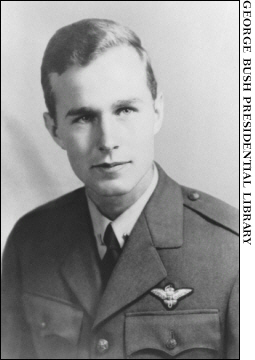
George Bush as a young officer
For a man who spent so much of his life in the public arena, President Bush was curiously inarticulate about those defining moments. He was battle-scarred in a way that the man he served as vice president, Ronald Reagan, was not; but next to Reagan, Bush always looked a little like the younger kid, wide-eyed with hero worship.
Even when invited to expand on his thoughts about how World War II shaped him, President Bush is a reluctant witness. Yes, of course, he considers his years as a Navy combat flier an important experience. He often thinks about the day he was shot down, but when he does, he's more likely to think about his two buddies who were killed. Could he have done more to save them?
When he returned home and plunged into a college education at Yale, sharing very crowded quarters with his wife, Barbara, and other couples in a New Haven home hastily converted into an apartment building, Bush didn't look back. He played varsity sports, got his degree, and headed west, to the oilfields of Texas and the opportunities they presented. Did combat make him more willing to take those kinds of risks?
“I do not believe my combat experience was in any way responsible for my coming to Texas,” he reflects now, adding, “The Navy sent us all over . . . so a move away from a home base was not so traumatic.” In that regard, George and Barbara Bush were like many young Americans in their postwar migration to other parts of the country. Kids from the Great Plains who joined the Navy returned to settle down hard by the sea in California. Young black veterans headed north to the good factory jobs in Detroit. World War II rearranged more than the political landscape of Europe and Asia; it was a major catalyst for the shifting population patterns of the United States in the fifties and sixties.
As for business, President Bush agrees that, yes, “both military training and experience were helpful to all of us as we tackled various businesses. Maybe, just maybe,” he concludes, “having taken risks in the service, we were less concerned about taking risks in business.”
Overall, however, responding to questions about his youthful trials in combat, President Bush likes to invoke what was drummed into him at home even before he enlisted: honor. As he says, his service in the war was “a duty, yes, but truly an honor.” He also feels strongly it was an obligation of citizenship that requires no additional reward. “What are we âowed'?” he asks. “Nothing. Not one damn thing.”
However, it is clear President Bush did gain something personally from the war that he would not have experienced if he had gone directly to Yale and then on to, say, a career on Wall Street or even a political career from his home in Connecticut. He saw the other side of life through the eyes and some very private thoughts of his comrades from other classes back home.
As an officer on a carrier, even though he was only nineteen or twenty at the time, one of Lieutenant Bush's jobs was to read the mail of the enlisted men before it went out so no sensitive military information would be inadvertently compromised. As Bush recalls, “As I did my duty and read the other guys' mail, I learned about lifeâabout true love, about heartbreak, about fear and courage, about the diversity of our great country. The sailors would ask about the harvest or fishing or the heat in the cities.” Bush goes on, “When I would see a man whose letter I had censored, I would look at him differently, look at him with more understanding. I gained an insight into the lives of my shipmates, and I felt richer.”
As a young man at the controls of a TBM Avenger, flying off carrier decks, dropping torpedoes on enemy targets, and getting back safely, Bush was a long way from those days of privilege in Greenwich. What he learned went well beyond his own involvement, however. He remembers vividly standing on the carrier deck when another plane made a bad landing. As the pilot tried to take off again, the plane veered out of control and its propeller cut a crew member in half. As Bush stood there, stunned, staring at a severed leg, a salty chief petty officer “rallied the shocked sailors. âGod-damnit, get back to work. Swab the deck, clear the deck, get ready for the next plane.' ” More than fifty years later that Navy chief stands out in the mind of President Bush as a man who, under great adversity, took charge, rallied the men, got the job doneâdid his duty.
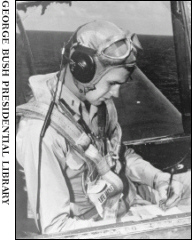
George Bush as a Navy pilot
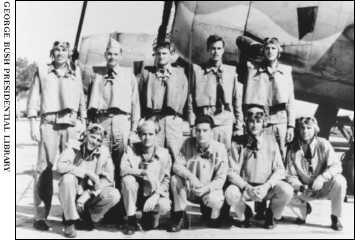
Fort Lauderdale Naval Air Station,
July 1943, Flight 44: (top row) Bill Dono
van, Ralph Cole, Mort Landsburg, George
Bush, Louis Grab; (bottom row) Mike
Goldsmith, Leslie Mokry, Bill Shawcross,
Tom Campion, Tex Ellison
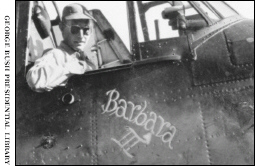
George Bush, in his plane
Barbara III
By his own admission George Bush is not a reflective man. It may have to do with his mother's constant counsel not to draw attention to yourself. Work well done and a life lived honorably were reward enough. As a former congressman, ambassador to the United Nations, director of the Central Intelligence Agency, vice president, and then president of the United States, George Bush represents an unequaled record of public service within his generation.
He insists he is owed nothing. In fact, he believes that World War II was such an overwhelming threat that those who served did so out of an obligation that should not require special treatment forevermore. He believes some veterans' organizations are wrong to keep asking for more and more benefits. As he says, “Serving in World War II, I was a tiny part of something noble.”
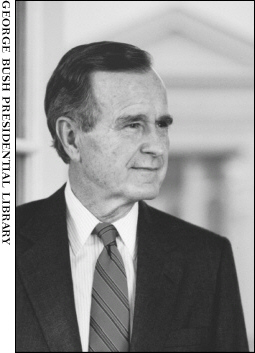
George Bush, presidential portrait
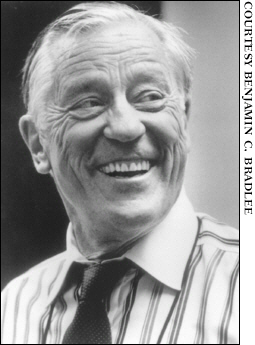
Ben Bradlee
BEN BRADLEE
“It separates those of us who were in the war from those
who never had that kind of experience.”
B
EN BRADLEE
, the son of a prominent Massachusetts family, was a Greek major at Harvard when war broke out. Eager to become involved, he made arrangements to fulfill his degree requirements in an abbreviated time so he could get into uniform. In his bestselling autobiography,
A Good Life,
he describes August 8, 1942, as a “day that has defined hectic for me forever.” I should think so. He was awarded his Harvard degree at ten in the morning, commissioned as a Lieutenant, J.G., in the U.S. Navy at noon, and married that evening in a small chapel across from the Boston Common to the daughter of one of Massachusetts's most prominent families.
No doubt other young men across the country were undergoing similarly life-changing days that summer, but few could match the Harvard degreeâNavy commissionâsociety wedding trifecta of Benjamin Crowninshield Bradlee. It was a portent of the life he was to lead for the rest of the century.
Bradlee was assigned to a destroyer, the
Phillip,
in the South Pacific. He was in the middle of the action in what is called “The Slot,” a stretch of water bisecting the Solomon Islands, islands that were bloody killing grounds for the U.S. Marines. It was in The Slot that the fight for control of the seas between the U.S. Navy and the Japanese Navy was both critical and ferocious.
It was there that Ben Bradlee, who had been tutored in French as a child and sent only to the best schools, began to learn about the real meaning of personal responsibility. “I remember,” he says, “the first day I was made officer of the bridge. I was twenty-one years old. I was in charge of the ship. I am driving this goddamn thing. It was a tremendous responsibility, and at twenty-one it was good to see what you could do.”
Bradlee was also able to see what others, those who lacked his pedigree, could do. He laughs and says, “They were all a guy named Joe with an unpronounceable last name.
They
could fix the radar, and
you
couldn't. I learned a tremendous amount about how excellence had nothing to do with class.”
One long night off Saipan, Bradlee had a lesson in excellence and courage that sticks with him to this day. He was working in the ship's command and control center, directing the shells the
Phillip
was booming toward the island. His partner on shore was an anonymous Marine forward observer. “Often when he hit his radio to talk,” Bradlee says, “we could hear the Japanese yelling in the background. They were that close to our guy.”
After hours of this harrowing duty, the forward observer said he could use a break, that he'd like to get off the island and out of danger for a while. Bradlee radioed right back: “ âSure, we'll come get you, give you a decent meal and a night's sleep.' My God, when he got onto our ship he looked about thirteen years old. He was tiny and so heroic. I get all excited even now thinking about it. We kept him for two nights, scrubbed him up and sent him back. I know I learned a lot from those experiences.”
What Bradlee learned, he says, is that there are no tests or psychological profiles that can compare to the experiences of war when it comes to determining what capabilities people have within them. “The war took the cockiness out of you. You couldn't bullshit your way out the first time you were under fire.” It also gave this Greek major from Harvard an early lesson in what would become a defining characteristic of his personality. “I had not been a big leader before the war,” Bradlee acknowledges, “so the idea that you could persuade people to do things was awesome. Not only that you could, but that you had toâand it was fun and, my God, you were good at it.”
It also prompted Bradlee to think of a life outside the constraints of his establishment background. Before the war, Bradlee thought he'd probably wind up a stockbroker, working for a friend of his father, like so many of his peers. Then, World War II started and, in his words, “I had a sense of what was possible: how many different lives and professions were out thereâhow many exciting prospects in the world.”
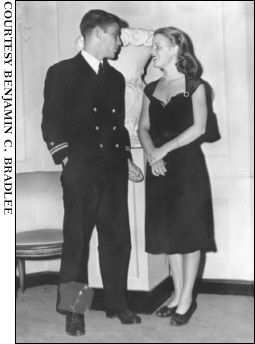
Ben and Jean Bradlee
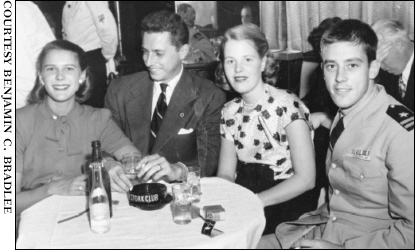
Constance Bradlee, John La Farge, Jean and Ben Bradlee, 1945
In his own privileged way, Bradlee was as provincial as any enlisted man from a small town in West Texas. He'd known only one way of life, and suddenly he had options. Bradlee remembers that once the war was over he led group discussions on his ship about what the men would do next. “I remember,” he says, “people were interested in public service; teaching got a big call. We were determined not to make the mistakes of earlier generations. I was hustling journalism as a way of righting wrongs.”
Ironically, about that same time, another young naval officer in another part of the Pacific was thinking about his future. He was going home to California, where shortly after the war he got involved in politics. His name was Richard Nixon, and thirty years later he and Bradlee would be on a historic collision course. Bradlee's vision of journalism as a means of righting wrongs was never truer or more important than when he was directing two young reporters, Bob Woodward and Carl Bernstein, in their coverage of Watergate.
After a lifetime of achievement and adventure that includes three wives; four children; six years abroad (most of them in Paris as a
Newsweek
correspondent); a close personal friendship with his fellow Harvard graduate John F. Kennedy; the editorship of
The Wash
ington Post
during Vietnam, the Pentagon Papers, Spiro Agnew, Watergate, and the fall of communism; his dazzling marriage to Sally Quinn and their large, comfortable homes in Georgetown, on the Chesapeake Bay, and in the Hamptons; Bradlee was a little surprised how vivid his recollections of the war were and how important they seemed to him in his seventies, when he was writing his autobiography.
Nonetheless, they remain stories and memories for his own satisfaction; he seldom shares them, not even with the two fellow officers from his destroyer, the
Philip,
who live in the Washington, D.C., area. As he was raising his children, three boys and a girl, Bradlee would occasionally bring up an experience from those days. When he did, the kids would say, “Uh-oh, here comes the Big Two.” Bradlee would like to go to a reunion of the men and officers of his ship, but he laughingly concedes that he hasn't been to one because his wife, Sally, has no interest, even though she's the daughter of a distinguished Army general.
It's probably just as well. Bradlee's life since those exciting days on the
Philip
has taken him to places and heights far removed from the lives of the other men on board. They shared a time and a place in their late teens and early twenties that could never be duplicated, and Bradlee has reserved a special corner of his memory for that distinctive experience. While a reunion might be fun, it's hard to imagine it could add to the original experience.
There are times when Bradlee doesn't hesitate to bring up the war years and the pride he has in his service record: when people question his patriotism, a not uncommon blasphemy leveled at journalists, especially one running the preeminent newspaper in the nation's capital. As Bradlee puts it, using one of his many favorite profanities, “I have a special reaction to those who impugn my love of country, especially those fââs on the Hill.” But Bradlee also believes it gives him a special bond with people like Senator John McCain, the Arizona Republican, Naval Academy graduate, and POW in Vietnam.
He thinks of the experience of World War II as being as important to his life as overseeing the Watergate reporting when he was editor of
The Washington Post.
He says, “It separates those of us who were in the war from those who never had that kind of experienceâthe teamwork, the danger of dying, the self-confidence we gained. I don't feel superior as a result of those days. I just know I learned a helluva lot from being there.”
He also believes this is true for almost everyone who served in the military, whether they saw combat or were heroes. “It wasn't just about throwing grenades or jumping into the water to save someone's ass,” he says. “God, my ship went from the coast of Massachusetts through the Panama Canal, forty days to Guadalcanal. When we started, I was the lowest cog in the machine. By the time we got there, I was really a part of something.”
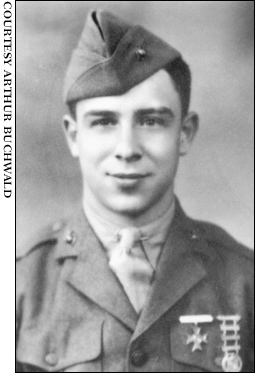
Art Buchwald, wartime portrait
